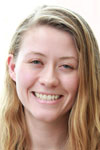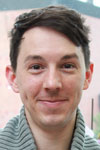Department of Biomedical Genetics researchers believe they have identified a new means of treating some of the most severe genetic diseases of childhood, according to a new study in PLOS Biology. The diseases, called lysosomal storage disorders (LSDs), are caused by disruptions in the functioning of the stomach of the cell, known as the lysosome. LSDs include Krabbe disease, Gaucher disease , metachromatic leukodystrophy and about 40 related conditions. In their most aggressive forms, they cause death of affected children within a few years after birth.

Nicole Scott-Hewett

Christopher Folts
The research was spear-headed by Nicole Scott-Hewett and Chris Folts, two recent graduates of the program in Genetics, Development and Stem Cells. Led by the article's corresponding author Mark Noble, Ph.D., the team discovered for the first time how specific toxic waste products that accumulate in LSDs cause multiple dysfunctions in affected cells. They also found that several drugs already approved for other uses have the unexpected ability of overcoming the cellular toxic build-up, providing new opportunities for treatment. Key to this discovery was the finding that these drugs can help restore normal acidification of the lysosome.
In a mouse model of Krabbe disease (one of the most severe LSDs), Drs. Folts and Scott-Hewett found that their lead study drug, colforsin, increased survival as effectively as in studies where disease-causing mutations were corrected by gene therapy. Colforsin is approved in Japan to treat cardiac disease, which provides information to investigators about its use in humans.
Increased survival in mice occurred even though treatment was started later than is necessary for gene therapy. The research treatment also decreased damage to the brain and improved the quality of life in the diseased mice. All of these outcomes are critical goals in the treatment of children with Krabbe disease or related illnesses, said Noble, who is the Martha M. Freeman, M.D., Professor in Biomedical Genetics at URMC.
"One of the great challenges in these diseases is that they are both rare and come in many different varieties, and advances have tended to focus on single diseases," Noble said. "In contrast, our findings suggest our treatments will be relevant to multiple disorders. Also, we saw benefits of our treatment even without needing to correct the underlying genetic defects. That gives us great hope that we could combine our treatments with other candidate approaches to gain additional benefits."
If the results can be translated into humans, Noble said, the repurposed drugs might improve the quality of life for afflicted children while more difficult experimental genetic treatments are pursued. The complete study can be found at: PLoS Biology